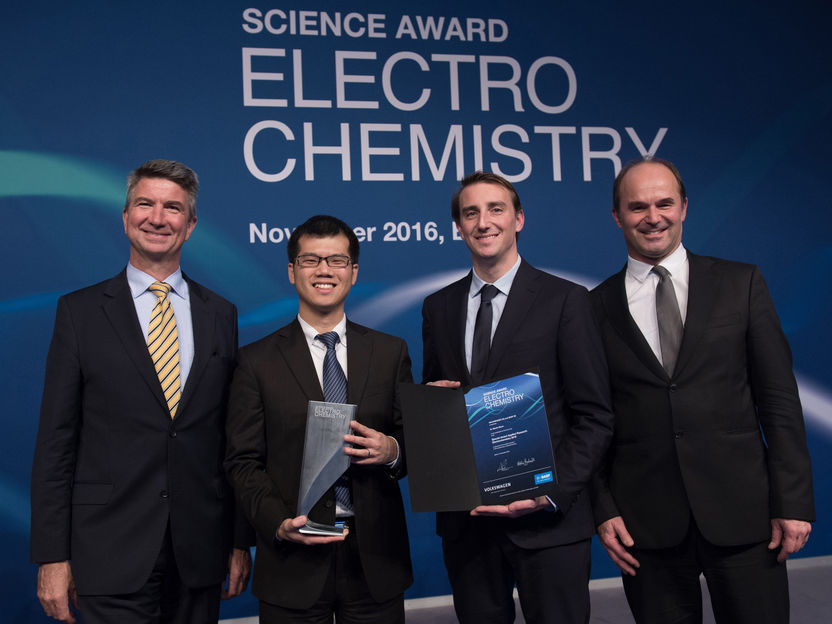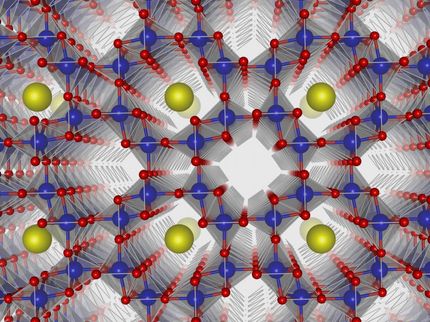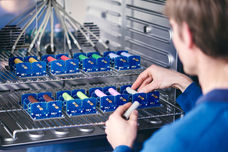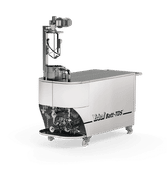Volkswagen and BASF present “Science Award Electrochemistry”
Award honors outstanding research results in the area of energy storage and conversion
Advertisement
The BASF and Volkswagen international “Science Award electrochemistry 2016” goes to Dr. William Chueh from Stanford University, California. The jury of representatives from BASF, Volkswagen and from academia selected him for his outstanding research results in the area of energy storage and conversion. On the occasion of the 5th ceremony of the science award, a special prize for applied research goes to Dr. Martin Ebner from the ETH University Zurich, Switzerland for his excellent research in the area of fast charging of lithium-ion batteries.

Science Award Electrochemistry 2016: Dr. Ulrich Eichhorn (Volkswagen), Dr. William Chueh (Science Award Winner), Dr. Martin Ebner, (Special Award Winner), Dr. Martin Brudermüller (CTO BASF).
BASF SE
Dr. William C. Chueh is assistant professor at the Department of Materials Science & Engineering and Center Fellow at the Precourt Institute for Energy – both at Stanford University in California. He has attained a new level of understanding for diverse fundamental battery dynamics which limit battery rate capability and life cycle. His insights are paving the way for further improving lithium-ion batteries and significantly enhancing their performance. By visualizing electrochemical reactions as they take place on length scales ranging from tens of microns down to sub-nanometer, William Chueh has delivered unprecedented insights into the design of functional materials with novel compositions and structures. With the “Science Award Electrochemistry” he receives prize money of €50,000.
Dr. Martin Ebner received his PhD in Material Science at the ETH University Zurich. His research focuses on new methods to increase the charging rates of lithium-ion batteries with novel electrode processing methods while reducing production costs. Martin Ebner is developing innovative battery anodes that allow fast charging and reduce degradation problems in the battery. In summer 2015, he received funding of the ETH Pioneer Fellowship program and founded the start-up Battrion AG in Luzern to pursue the commercialization of his innovations. The special prize for applied research is worth €15,000.
“BASF’s goal is to create chemistry for a sustainable future. And we all know that the battery is at the heart of electro-mobility. There is huge potential for systematic technological progress in this field, but there are scientific challenges we have to overcome,” said Dr. Martin Brudermüller, Vice Chairman of the Board of Executive Directors and Chief Technology Officer at BASF in his laudation. “The science of electrochemistry is a key research field for sustainable future mobility. Therefore, we need top-notch R&D around the globe performed by excellent researchers who inspire each other and lead their scientific communities to constantly develop new and better solutions.”
Dr. Ulrich Eichhorn, Head of Group Research and Development for Volkswagen AG, stressed the overriding importance of electric drive to the future of mobility: “Within the Volkswagen Group, we have a clear strategy for how we want to put battery-electric vehicles into series production across our brands and in many different market segments. However, a major prerequisite for success in the volume market is more powerful battery concepts. In Volkswagen Group Research and Development we are focusing on close cooperation, not only with industrial partners but also with the smart minds of the scientific community. The winners of our Science Award are an excellent example of innovative and creative ideas in this field.”
Knowledge of electrochemical processes and their application in the field of materials, battery cells or storage systems is key to developing future energy storage devices. Without these technologies, it is not possible to provide climate and resource-saving power supplies using regenerative energy or to achieve future drive concepts such as electric mobility. Current energy storage devices have so far been unable to attain the performance which power supply and mobility customers are accustomed to. For this reason, Volkswagen and BASF aim to motivate researchers of excellence working in science and corporate research to place even more commitment to the field of electrochemistry and its applications.
Other news from the department people
These products might interest you
Most read news
More news from our other portals
See the theme worlds for related content
Topic World Battery Technology
The topic world Battery Technology combines relevant knowledge in a unique way. Here you will find everything about suppliers and their products, webinars, white papers, catalogs and brochures.

Topic World Battery Technology
The topic world Battery Technology combines relevant knowledge in a unique way. Here you will find everything about suppliers and their products, webinars, white papers, catalogs and brochures.


































































